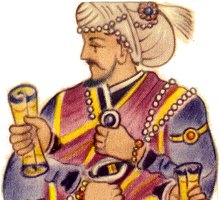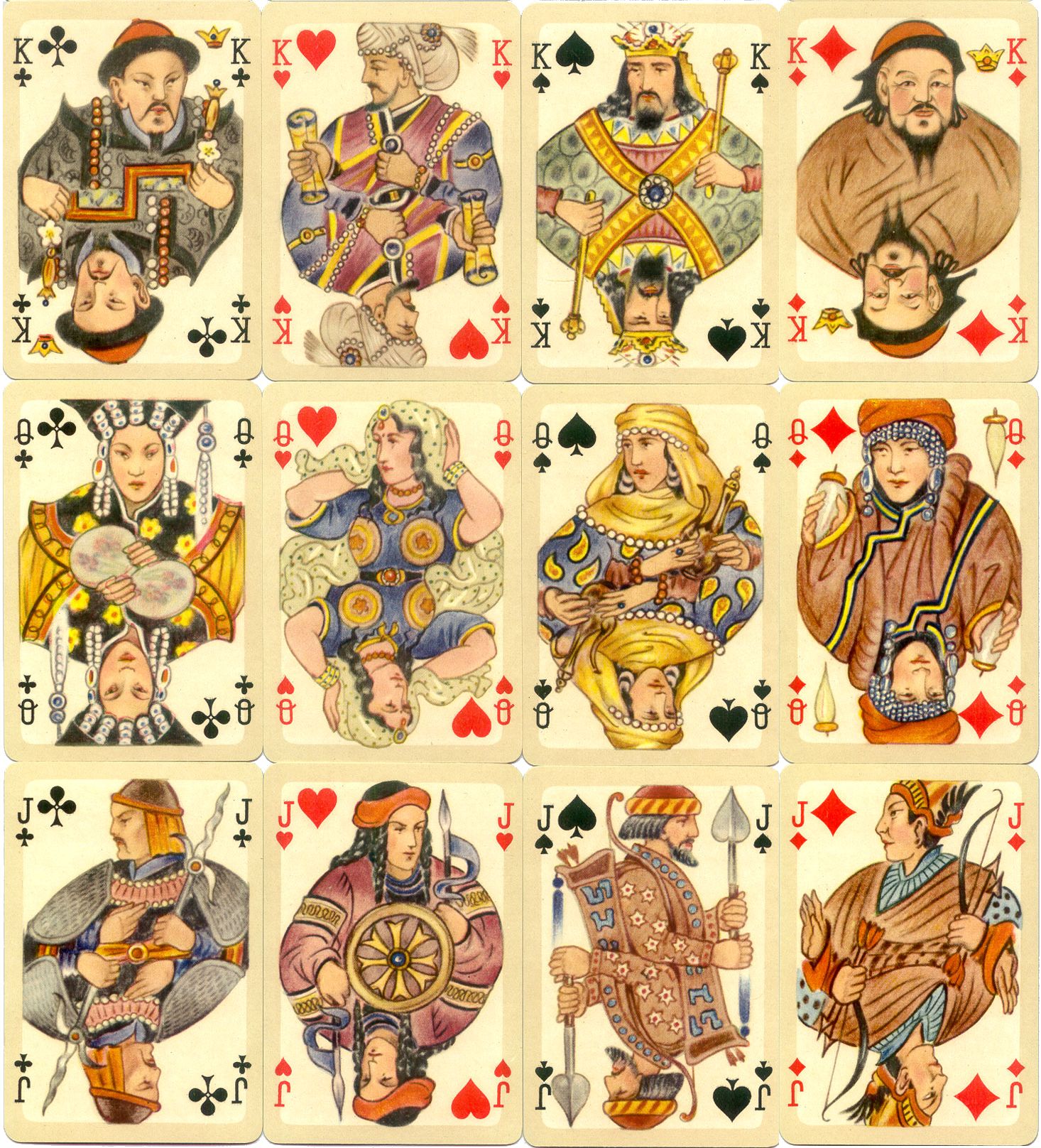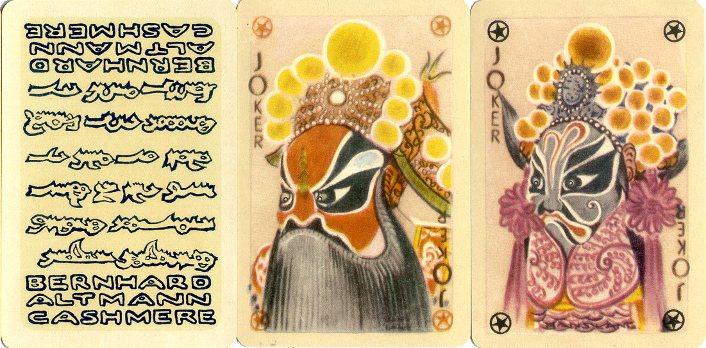Cashmere
Bernhard Altmann is from the “The House of Cashmere” and these playing cards honour their best known commodity: the fleece of the graceful horned Cashmere goat.

Bernhard Altmann: Cashmere Playing Cards
Manufactured by: Ferd. Piatnik & Sons, Vienna, 1950s
Bernhard Altmann is from the “The House of Cashmere” and these playing cards honour their best known commodity: the fleece of the graceful horned Cashmere goat. Hans Lang created the symbolic artwork for the deck, dedicating each suit to the group of people that had the greatest significance for Cashmere through the ages: Clubs-Chinese; Hearts-Indians; Spades-Persians; Diamonds-Mongolians. The King of Clubs is Ch'ien Lung, the wisest of modern Chinese emperors. The King of Hearts is Aurung-Zeb, Indian warrior, ruler of the Mogul Empire. The King of Spades is the Persian Nadir Shah, who conquered the Empire of the Moguls. The King of Diamonds is the Mongol, Kublai Khan, grandson of Jenghis Khan, host of Marco Polo and the first known patron of the Cashmere trade...


Above: the 12 court cards from Bernhard Altmann's "Cashmere Playing Cards" printed by Ferd. Piatnik & Sons, Vienna, c.1950s. The court cards are warriors, rulers and women who were particularly interested in the Cashmere trade. Ace to 10 (not shown) are vignettes that portray attributes of each group of people.
Right: The Artwork on the back of the cards in Ancient Mongol script is the Seal of Khans: "when the command of the allpowerful Khan of the Great Mongol People, which is as the might of Eternal Heaven, is handed down to subject peoples, they must tremble and obey." One back is in red and one in black. The Jokers have Chinese Theatrical Masks. The back of the box is marked 'Made in Austria by Ferd. Piatnik & Sons Vienna'. Images courtesy Barney Townshend.

By Barney Townshend
Member since October 06, 2015
Retired Airline Pilot, interested in: Transformation Playing Cards, Karl Gerich and Elaine Lewis. Secretary of the EPCS. Treasurer of the IPCS.
Related Articles

Tactics Design
Late modernist Japanese playing cards designed by Masayoshi Nakajo for Tactics Design.

Luditz Pattern by Georg Geiselreiter
The discovery of 2024 changes the current state of knowledge of the history of this pattern.

The Decadent Deck
Studies in the eroticism of the female body by Inge Clayton.

Historic Shakespeare
“Historic Shakespeare” playing cards featuring Shakespearean characters by Chas Goodall & Son.

Sunday Night / Nichiyoubi no Yoru
An irreverent, avant-garde deck unofficially titled "Nichiyoubi no Yoru" (Sunday Night), designed by...

Emilio Tadini playing cards
Beautiful dreamlike playing card designs by Emilio Tadini.

Zürcher Festspiel 1903
Swiss-suited pack designed by Robert Hardmeyer featuring figures from art and politics.

Never Mind the Belote
Limited edition Belote pack with designs by a collective of 24 street artists.

Ukraine playing cards
Historical figures from Ukraine’s past in a familiar Piatnik style.

Playing card designs by Franz Exler
Reconstruction of playing cards from the original 1903 designs.

MITSCHKAtzen
Clever cat designs by the Austrian artist and illustrator Willi Mitschka.

22 Pittori in 22 Arcani
Collaborative Tarot with contributions from 22 different Italian artists including Menegazzi and Tav...

Tarock Cards by NIL Spielkartenfabrik
A deck of tarock cards from the eastern end of the ending Austro-Hungarian Empire.

Whist by Ditha Moser
Ditha Moser created this minimalist Whist deck in 1905, in the style of the Vienna Secession art mov...

Keith Haring playing cards
Energetic graffiti images by the American artist Keith Haring.

Gabriel Uffenheimer
Rare example of the production of Johann Gabriel Uffenheimer, Guntramsdorf, 1825.
Most Popular
Our top articles from the past 28 days

